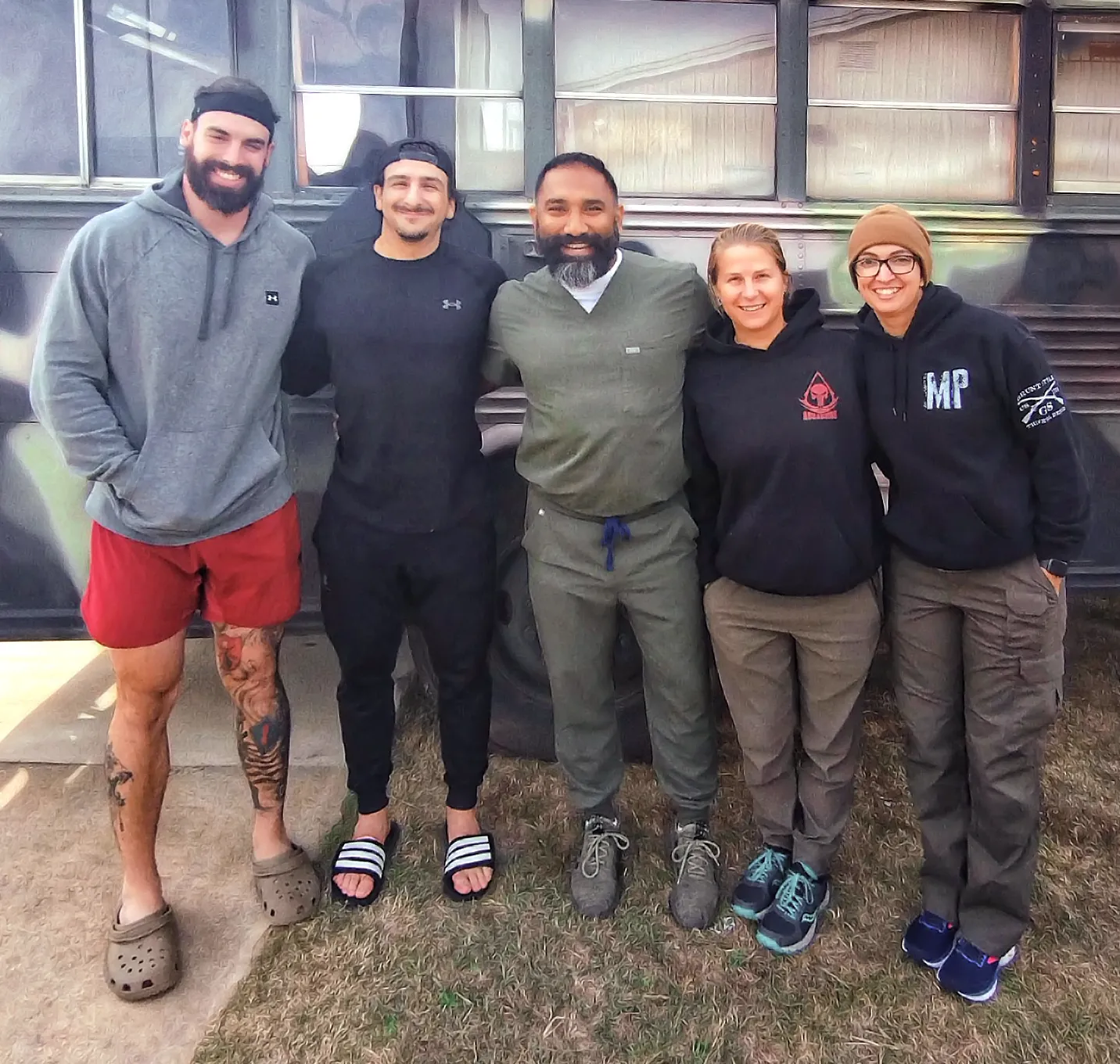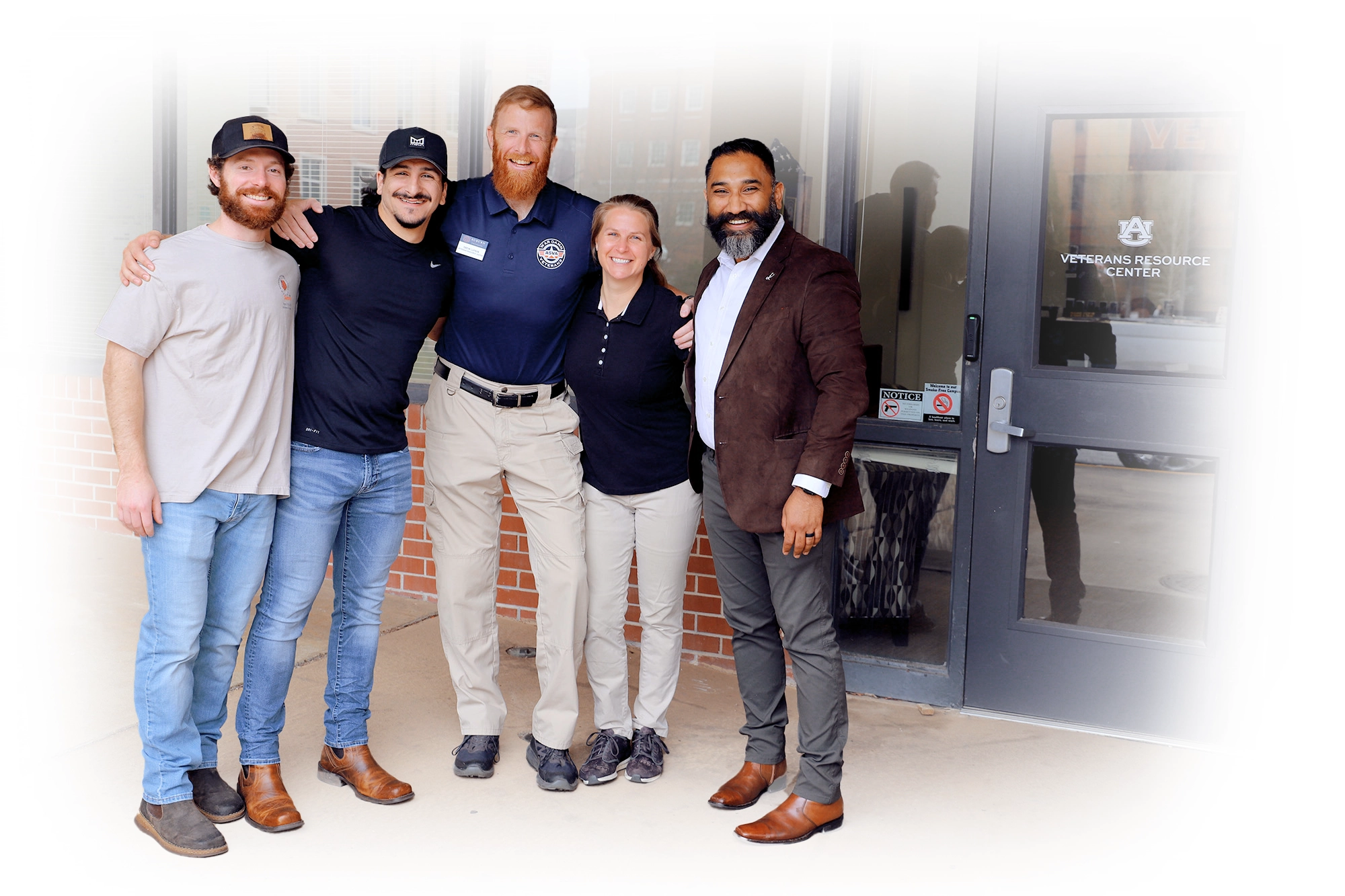

An unlikely crowd files into the basement in Foy Hall—the dean of the College of Education, faculty and graduate students, and military veterans, who also happen to be students at Auburn University. Each selects a box lunch and finds a seat amid the laughter and storytelling. Breaking bread is an apt description. This is a gathering about more than food. It’s about sharing and connection.
It makes sense for the college to sponsor the first “Third Friday Connections” lunch hosted by Auburn’s Veterans Resource Center, or AVRC. Connection is at the heart of the partnership between the college and the AVRC and Auburn’s Student Veterans Association, or ASVA.
After officially becoming the first academic partner of the student veteran organizations last fall, college leaders, faculty and students stepped up to demonstrate that this is more than a transaction—this is a true partnership.
“We’re always grateful when people want to support the work we do and the student veterans we serve,” said Paul “Puck” Esposito, director of the AVRC. “But when a group says they want to help and then shows up in a big way to do just that—that’s special. And that’s also when we know we don’t just have supporters, we have partners. The College of Education has shown us it’s our partner and our friend.”
Operation Iron Ruck
In 2018, Operation Iron Ruck, or OIR, was founded when student veterans from Auburn University and the University of Alabama joined forces to help their fellow veterans and bring awareness to the alarming rate of veteran suicide. Each Iron Bowl since, student veterans, veteran alumni, ROTC cadets from both Auburn and Alabama, and other supporters have set aside their rivalry and embarked on a 151-mile ruck march across the state, starting at the away team’s stadium and ending at the home team’s stadium. On their march, they carry the game ball for the highly anticipated Iron Bowl football game, as well as 22 pounds of gear to symbolize the 22 veterans who lose their lives to suicide each day.
The state of Alabama has one of the nation’s highest veteran suicide rates and OIR’s mission is to increase the public’s knowledge on this issue while uniting veterans in the community, funding charities, championing veteran suicide education and supporting local veteran organizations.
Although faculty and students from the College of Education have assisted OIR participants in the past—mostly in the form of physical training sessions prior to the ruck—the partnership created in 2023 amplified the college’s support and participation.
The college supported OIR as a gold-level sponsor, but even more than the financial contribution, students and faculty joined student veterans from both universities on the march.
“Growing up with grandfathers in the military, I have always wanted to provide support to our country’s veterans who often get forgotten,” said Phil Agostinelli, a kinesiology doctoral student and OIR participant. “During my time at Auburn, I’ve had that chance to do so through health and wellness initiatives with the ASVA. I’ve heard so many stories about their experiences and the impact OIR had on their lives and the lives of other veterans. I wanted to support that in any way possible.”
Kate Frick, a doctoral student with Agostinelli in the School of Kinesiology’s Warrior Research Center, also spent the entire three days of OIR with the student veterans. Her role was not to march, but to serve.
“I provided medical support in the way of evaluation and treatment of musculoskeletal injuries, and blister care—lots and lots of blister care,” she said. “The days were definitely very long with the ruck, working round the clock. Caffeine and the amazing premise of the ruck kept me going.”
During the “Third Friday Connections” lunch, Lufkin presented Frick with an award for her service to student veterans, describing her work as critical.
“She worked tirelessly, days and nights, to help people on the march,” he said. “She couldn’t have slept more than a few hours during the entire three days and her work ensured people could stay in and finish the ruck. She was just incredible.”
Frick and every College of Education participant cited OIR’s mission as their motivation. She began her career working as an athletic trainer but after working with soldiers during a stint at Fort Sill, Oklahoma, the trajectory of her career changed.
“The experience of working with Army members allowed me to find the ‘why’ in my professional life,” she said. “I’ve now focused on making it my life’s work to support and enhance the lives of those who serve our country.”
Harsimran “Sim” Baweja, director of Physical Therapy, comes from a long line of family members who served in the Indian military, including his father, a bomber-reconnaissance pilot with the Indian Air Force, who died in a peacetime aircraft malfunction during active duty. Baweja’s mother, brother, sister-in-law, grandfather and uncles are also affiliated with the Indian military.
“My whole family tree except me has served or is serving in the military,” he said. “Armed forces personnel anywhere—active duty or veterans—are close to my heart and family. Warfighter health in every form is important. So, supporting our veterans in Operation Iron Ruck was a no-brainer for me.”
As a physical therapist, Baweja’s services were in high demand during the Thanksgiving Day break.
“It was an absolute honor and privilege to spend Thanksgiving with them,” he said. “We were there for them. That’s all that matters. While we were there, I provided physical therapy as needed to the vets and supported our student, Kate Frick, who is an athletic trainer. She provided medical support for the event for the entire three days.”
As is often the case with serving others, the students and faculty who supported OIR walked away from the experience saying they were the ones who benefited most—even more than the student veterans.
“My biggest takeaway from this experience is how many phenomenal people I had the opportunity to meet, all coming together to support this mission,” Frick said. “So many individuals rucked around the clock over a major holiday weekend to raise awareness about this critical issue. It was an amazing and truly humbling experience to be a part of and I will definitely be involved in the Iron Ruck again this year and for years to come if they’ll let me tag along.”
Agostinelli agreed.

The Future
Lufkin has some ambitious dreams for the ASVA, and the College of Education intends to support those ambitions whenever and wherever it can.
“One of the strengths of a partnership like this is our ability to share expertise, connections and resources that the student veteran community might not otherwise be able to access,” Fairbrother said. “From innovative ideas with our counselor education programs to continued support from the School of Kinesiology and a variety of options in between, we’re determined to stand with them and support wherever we can.”
But at the end of the day, what the two organizations are creating is a relationship.
“I think that’s what I really like about this partnership,” Lufkin said. “We’re developing relationships. Whether we’re having lunch together or doing something major like the ruck, we’re building relationships. And that’s how this will become something great—one conversation and experience at a time.”